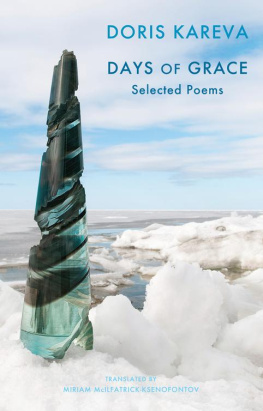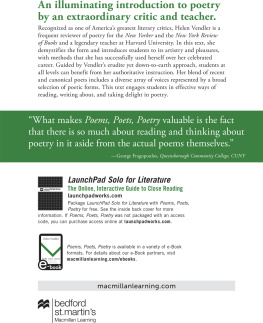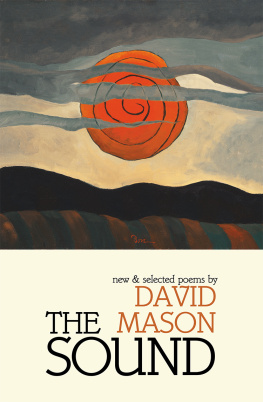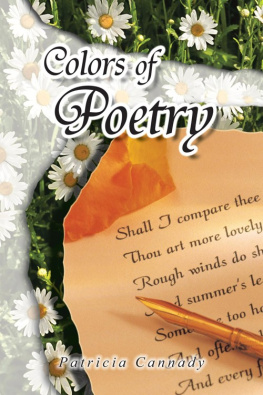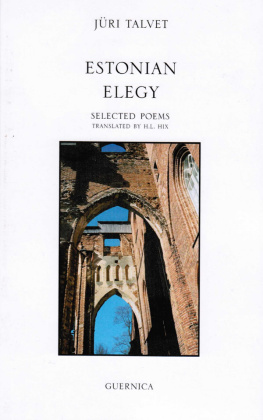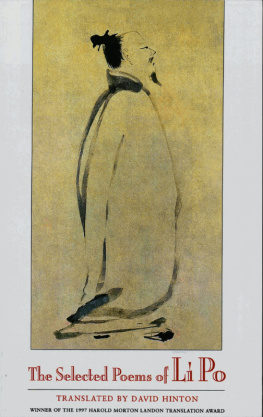translated by Miriam McIlfatrick-Ksenofontov Doris Kareva is one of Estonias leading poets, admired especially for poems that balance precision and control with passion and bravado. Her achievement, according to
, is in writing poems which are both plentiful and fragile like a crystalbalancing on the line between the human soul and the universe, between sound and silence.
spans over forty years of her poetic output, showing how the sustained depth and clarity of her poetry lies in her ability to create ambiguity and suggest harmony at the same time, with a multiplicity of meanings generating the opposite of clarity: a form of hinting which at its most illuminating becomes utterly oracle-like. Such is the metaphysical sensitivity of her poetry that its moral charge is sensed almost physically. She has also been called a priestess of love who is fearless as well as discreet in her portrayal of love that is so pure and elevating like mountain air that she seems to be writing from another time or dimension. There is a fierce austerity and dark humour in the language.
Ciaran Carson McIlfatrick-Ksenofontovs translations capture the barely capturable essence of Doris Karevas poems which, quite suddenly, make me think of snowflakes, crystalline, and yet on the cusp of disappearance. Marius Kociejowski Cover art Ivo Lill
Cover photography: lo Josing
The poems in this edition have been selected from the following books:
Pevapildid (Photographs), Eesti Raamat, 1978;
pildid (Night Shots), Eesti Raamat, 1980;
Puudutus (Touch), Eesti Raamat, 1981;
Salateadvus (Secret Consciousness), Eesti Raamat, 1983;
Vari ja viiv (Shadow and While), Eesti Raamat, 1986;
Armuaeg (Days of Grace), Eesti Raamat, 1990;
Maailma asemel (In Place of the World), Loomingu Raamatukogu, 1993;
Hingring (Soulcircle) Huma, 1996;
Mandragora, Huma, 2003;
Aja kuju (Shape of Time), Verb, 2005;
Thendused (Meanings), Verb, 2007;
Deka, Verb, 2008;
Olematuse aiad (Gardens of Nothingness), Verb, 2012;
Lpmatuse lvel (Brink of Infinity), HeadRead, 2015; and also the literary journal
Looming (Creation), issues 11/2013, 8/2014 and 12/2015. Some of the translations were previously published in
Windship with Oars of Light (Huma, 2001),
Pratilipi (2012),
Lpmatuse Lvel (HeadRead, 2015),
Contemporary Estonian Poetry, A Baltic Anthology: Book 3 (University of New Orleans Press, 2013), and in
Indian Quarterly (2017) where the foreword appeared as a translators note.
Perhaps the clearest expression of what drives Doris Karevas poetry appears in an article she has written about her father, the composer Hillar Kareva, where she says of both human existence and the act of creation: our means are limited, our possibilities limitless. The article is entitled Lesson in Harmony (
see pages -20) and therein lies the key to Karevas poetics a striving for concord between that which seeks expression through language and language which does not allow it to be expressed. At times, a truth seems to be half-hidden / half-revealed in and by the words; at others, the whole momentum of a poem seems to depend solely on the physicality of the words.
Words often hint at or flit around an idea or an insight, illuminating in a manner that has been described as oracle-like or like a snowflake on the cusp of disappearance. Most of her poems occupy little space on the page, yet aspire to grasp and articulate something essential in a way that both embodies and defies definition. Sound, meaning and silence overlap and interact to the extent that whole poems appear diamond-like: resilient, incisive and multi-faceted all at once. The sustained depth and clarity of Karevas poetry lies in her ability to create ambiguity and suggest harmony at the same time. Over 40 years of poetic output, she has explored the ecstasy and the pain of existence in terms of the sensual and the intellectual. Her poetry evokes and erases the line between the human soul and the universe, between man and god, between voice and silence.
I first encountered Karevas poetry as a student of the Estonian language when I was given a copy of Armuaeg (Days of Grace) for pronunciation practice. I clearly remember the pleasure I felt in reading her poems aloud; I understood little more than isolated words and phrases, fragments of meaning, but the sounds and rhythm had already captivated me. To translate such poems into English has been to tread a path of discovery of the limits and the potential of my own language. MIRIAM McILFATRICK-KSENOFONTOV
Yes. In the beginning was the Word. I heard and I woke.
Still dazed with dreams in the dimness I discerned on the edge of my bed an angel. He gazed at me in silence I was not certain why. That gaze held sway. I felt a new and tranquil spirit take hold of my troubled self. I had an inkling of aeons, of what awaits the world no sense of unease, just insight, serene and willing the wisdom of love. Then he kissed me on the eyes.
I felt the briefest brush of lips and bliss a heavenly gift! as yet unaware for how grave a voyage I had been blessed.
Every day every night someone appears, eyes seared. Never a word of what he saw in the land of the living.
If you speak only once, the onus is so great that not a word seems worth saying. If you live only once, the prospect is so great that you freeze and speechless let it pass.
If I do not speak of this, I will die.
If I reveal it, it will kill me. What on earth do I do?
Dont call. Dont ask. My eyes are stalactites in the cavern of the night. My heart thuds: a stone axe in the pain-sparking darkness.
In a nightlit room the air blooms.
In a nightlit room the air blooms.
Half-voiced, eyes closed they converse two angels over a glinting sword. Mirror discourse, steady sporadic silence, hellbent ontogenesis.
A paw extends in the dark to probe the flow. Theres no knowing what will cling to longing. Raw rough-edged words, terse and true, translation-proof, from table to rafters.
My hair grows up through the ceiling and grapples with clouds that pass And what becomes of it I cannot see and I do not dare to ask For up there is light and faces luminous pale gliding along so sleek and down here are beetles, grubs and snails and clay against my cheek
I call you and I sense that you call me.
My hair grows up through the ceiling and grapples with clouds that pass And what becomes of it I cannot see and I do not dare to ask For up there is light and faces luminous pale gliding along so sleek and down here are beetles, grubs and snails and clay against my cheek
I call you and I sense that you call me.
But I cannot hear if it is so at all. There are chasms over which no bird will fly. And silence like a wall. There are phantasms that petrify the soul.
No, this light will not fade from memory. Just the thought of that March is fraught.

